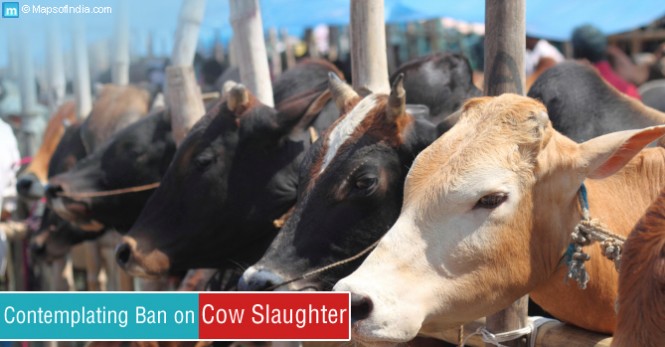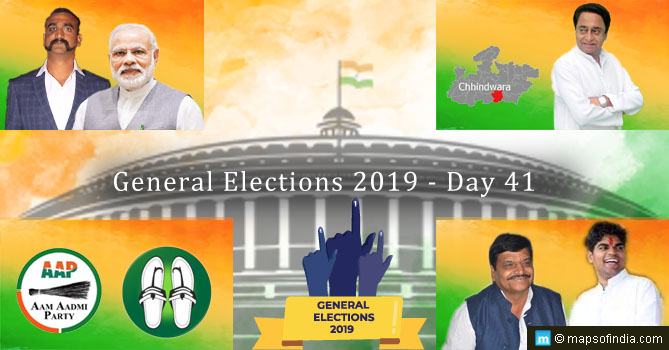 Very recently, the Indian Government has banned cow slaughter in Maharashtra and Madhya Pradesh. This is a decision that has seen a fair share of dissension. Now, Rajnath Singh has stated that NDA will try and make this a nationwide affair. He has, however, stated that this decision will be taken only after a consensus has been reached on the same. The prominent BJP leader and present Home Minister of India has made it rather clear that cow slaughter will not be accepted in the country. Incidentally, both the states in question are ones where the BJP is in power. Cow slaughter is also banned in Gujarat, which is ruled by BJP as well. Singh has reiterated that there should be no doubt that the present government is fully committed to stopping the practice of slaughtering cows.
Very recently, the Indian Government has banned cow slaughter in Maharashtra and Madhya Pradesh. This is a decision that has seen a fair share of dissension. Now, Rajnath Singh has stated that NDA will try and make this a nationwide affair. He has, however, stated that this decision will be taken only after a consensus has been reached on the same. The prominent BJP leader and present Home Minister of India has made it rather clear that cow slaughter will not be accepted in the country. Incidentally, both the states in question are ones where the BJP is in power. Cow slaughter is also banned in Gujarat, which is ruled by BJP as well. Singh has reiterated that there should be no doubt that the present government is fully committed to stopping the practice of slaughtering cows.
He has stated that the strict laws that have been enacted in the aforementioned states are an indication of the party’s intention to stop cow slaughter. Singh has also pointed out how quickly the BJP sent across the bill, which had been passed by the Maharashtra Government, to Pranab Mukherjee so that the President could provide his assent to the same. The Maharashtra Animal Preservation (Amendment) Act also includes in its fold similar animals such as bullocks and bulls. Acharya Shivmuni, a leader of Shwetambar Jains, has meanwhile asked the Indian Government to include buffaloes in the bill.
According to Singh, in order to impose a nationwide ban on cow slaughter, it is important that a consensus is reached on the issue in both houses of the parliament. However, that seems to be a difficult proposition considering BJP does not enjoy a majority in the upper house of the Indian Parliament. He has stated that back in 2003 when he used to be the Minister of Agriculture, the ministry had created a bill suggesting the complete restriction on slaughter of cows. Singh has also stated that when he tried to present it in the parliament there was a chain of vociferous protests that ultimately led to the bill being cancelled.
Singh has affirmed that it is imperative that the death of cows through slaughter is stopped in India. He has also requested people to come forward and create a consensus regarding the same. Shivraj Singh Chouhan, the Chief Minister of Madhya Pradesh, feels that killing a cow is akin to murdering a human being. He has stated that the anti-cow slaughter bill will be made tougher in the days ahead with slaughtering a cow being deemed as an offence equal to killing people.
Chouhan has also stated that in MP even consumption, sale, transportation and storage of cow meat are regarded as major acts of crime. The state government in MP had changed the Madhya Pradesh Prohibition of Slaughter of Cow Progeny Act during 2012. As per the amendment, it was the accused who was supposed to justify why his or her act of slaughtering a cow was not wrong.
Between 2009 and 2014, 12,000 people have been arrested in the state on charges of slaughtering cows and 1500 have been convicted. It was in 2004 that Uma Bharti, the then CM of Madhya Pradesh, brought out the Prohibition of Cow Slaughter Act. It was amended in 2010. As per the penal provisions of the Act, someone found guilty can be sentenced to a jail term ranging between one to seven years. As per the Act, the guilty will have to part with INR 10,000 as fine. In cases where beef, hide or cow is being ferried, the transporter, the co-owner of the concerned automobile and the driver will face legal proceedings as well.
The exact reasons for such decrees are not exactly known. However, one assumes there is a question of returning to the cultural roots of the country where majority of the people regarded cows as gods and thus worshipped them – there was no question of consuming them.
The main issue with such a thought process is that India is now a constitutionally recognised secular country where followers of every religion have the right to adhere to their practices, including their diet as well. Ban on slaughter and consumption of cow and similar bovine creatures will have a serious effect on people for whom it forms a regular part of their diet and consumed during religious events. Perhaps, the national government may do well to consider such effects before taking sterner measures with regards to cow slaughter and consumption.





